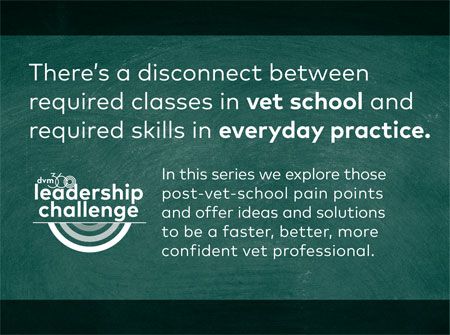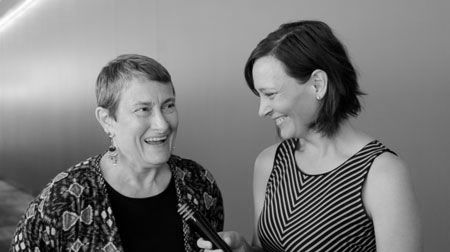Big biz is coming! Giving estimates stinks! Im stressed!
Corporate medicine, client interactions and stress management: Three Fetch dvm360 speakers have some strong opinions about what the nations veterinary schools could be doing to prepare their graduates for life on the outside
Bash Halow, LVT, CVPM
You didn't learn this in vet school: Private practice is changing forever

Bash Halow at a recent Fetch dvm360 conference.I'm not sure that someone in vet school should be teaching this, but vet students should know that the veterinary world is radically transforming and will be very much changed in as little as five years. This is mostly because of private equity money and larger corporations seeking to consolidate and take advantage of America's growing obsession with pets and the recession resiliency of animal healthcare.
A career as a veterinarian once provided gifted, precocious individuals a chance to experiment, risk, learn, be charitable, be entrepreneurial, be community leaders, be sources of local employment, be mentors, friends, and-eventually-wise, wealthy, experienced humans. I think the inevitable changes that are happening have trimmed that list considerably.
Whoever is running the show, corporation or private practitioner, they'll have choices. Should we pay our team members well? Should we strive for a great client service experience? Should we work hard to do the right thing by animals? Just because it's a corporation calling the shots doesn't mean it has to be Dickensian. Perhaps veterinary professionals simply have to rethink how this job will be done. Maybe fewer will fly solo and more will be part of a cooperative of focused individuals managing their hospital(s) for great client satisfaction and patient outcomes, but with an especially clearer focus on profit and efficiency. Maybe access to more capital from private equity will finally give vet professionals the resources they need to really win at animal healthcare.
Halow is a practice consultant and Fetch dvm360 educator. Read more from him here.


Dr. Sarah Wooten (right) interviews Dr. Robin Downing at a recent Fetch dvm360 conference.Robin Downing, DVM, DAAPM, DACVSMR, CVPP, CCRP, CVA, MS
I didn't learn this in vet school: Introversion doesn't help
The selection process for admission at veterinary schools continues to increase the population of introverts in the profession. Because effective communication with clients is at the heart of our ability to deliver medical care to our patients (or to pursue alternative careers to practice), for the majority of veterinarians, introversion is an enormous obstacle to be overcome. That isn't to say that introverts cannot be excellent veterinarians, but the point is that there is already so much medicine to learn, with exponential growth of that body of knowledge with each passing year, that adding one more barrier seems counterproductive.
You said it!
I would examine not only academic strengths, but also personal strengths in veterinary school candidates. Are you a leader? Have you exhibited compassion? Are you resilient? The best veterinarians care for the client and the patient equally. I'd ask vet school candidates to perform an exam designed to assess professionalism, interpersonal skills and emotional resilience to demonstrate how to respond to a range of issues they'll encounter in private practice. This would take the emphasis away from perfect grades or test scores, which really don't help you become a better or more emotionally resilient vet.
- Sarah Wooten, DVM
Bonus? You don't need an internship or residency to be a great doctor. Students should not be conditioned to believe that in school. While mentoring on the job after graduation is necessary, internships and residencies are not, and there are many graduates pursuing those positions who would be much better suited for alternative paths.
Dr. Downing is a practice owner and Fetch dvm360 educator. Read more from her here.
Sarah Wooten, DVM
I didn't learn this in vet school:Talking to clients about money and managing stress are hard
> I didn't know how to present a large estimate to a client. I had no idea how to talk about money when I graduated. Most clients I saw at the university were already prepared by the doctors or receptionists at their practice on how much money they were going to spend, so when we showed estimates with multiple zeros and a comma, clients didn't bat an eye. I graduated thinking that every sick pet got the minimum database of bloodwork, urinalysis, thoracic radiographs and abdominal ultrasound, and when I couldn't get clients to do that in my first job, I felt frustrated-like I was a failure. I wish somebody would have taught me that discounting is addictive, that it attracts the wrong customers, and that it erodes the value of what I provide and the practice's value. My motto shall be: If Grandma can't do what I'm offering on her kitchen table, then I should not feel bad about charging for my services.
> I didn't know how to work with staff. I was stressed all of the time at work-God bless 'em, my first team. Nobody taught me any leadership skills or stress management, so I took it out on them. I was petulant, demanding and short with my team. I know there are business management and stress classes at vet school now, but I also know that the students don't value them as highly as they do their clinical classes. I wish vet school would take soft skills seriously and treat them with as much respect as they do their clinical skills.
Dr. Wooten is an associate, dvm360 contributor and Fetch dvm360 educator. Read more from her here.